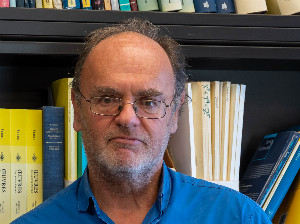Granville, Andrew

- Full Professor
-
Faculty of Arts and Science - Department of Mathematics and Statistics
André-Aisenstadt Office 6153
Courriels
Affiliations
- Membre Centre de recherches mathématiques
- Titulaire Chaire de recherche du Canada en théorie des nombres
- Membre CRM Centre de recherches mathématiques
Courses
- MAT6652 H - Distribution des nombres premiers
- MAT3634 H - Théorie analytique des nombres
Research area
- Analytic number theory
- Analytic combinatorics
- Pretentious analytic number theory
- ABC conjecture
- Distribution of primes
- Anatomy of integers
- Number theory
Student supervision Expand all Collapse all
Abstract
Abstract
Abstract
Abstract
Abstract
Abstract
Abstract
Abstract
Abstract
Abstract
Abstract
Abstract
Abstract
Abstract
Abstract
Abstract
Research projects Expand all Collapse all
Modélisation des défis émergents FRQNT/Fonds de recherche du Québec - Nature et technologies (FQRNT) / 2024 - 2028
Statistiques universelles en théorie des nombres FRQNT/Fonds de recherche du Québec - Nature et technologies (FQRNT) / 2024 - 2028
Questions in number theory CRSNG/Conseil de recherches en sciences naturelles et génie du Canada (CRSNG) / 2023 - 2029
Simons CRM Scholars Program Simons Foundation / 2023 - 2026
Centre de recherches mathématiques (CRM) FRQNT/Fonds de recherche du Québec - Nature et technologies (FQRNT) / 2022 - 2029
Centre de recherches mathématiques (CRM) CRSNG/Conseil de recherches en sciences naturelles et génie du Canada (CRSNG) / 2022 - 2027
Statistiques de tordues cubiques de fonctions L et d'autres familles FRQNT/Fonds de recherche du Québec - Nature et technologies (FQRNT) / 2021 - 2025
Developing an alternative approach to analytic number theory CRSNG/Conseil de recherches en sciences naturelles et génie du Canada (CRSNG) / 2018 - 2024
Chaire du Canada - Number theory SPIIE/Secrétariat des programmes interorganismes à lintention des établissements / 2016 - 2025
CENTRE DE RECHERCHES MATHEMATIQUES (CRM) FRQNT/Fonds de recherche du Québec - Nature et technologies (FQRNT) / 2015 - 2023
THE CRM : 50 YEARS OF SHAPING MATHEMATICAL SCIENCES IN CANADA CRSNG/Conseil de recherches en sciences naturelles et génie du Canada (CRSNG) / 2014 - 2023
THE CRM : 50 YEARS OF SHAPING MATHEMATICAL SCIENCES IN CANADA CRSNG/Conseil de recherches en sciences naturelles et génie du Canada (CRSNG) / 2014 - 2022
COMPUTER EQUIPMENT FOR THE RESEARCH OF THE CANADA RESEARCH CHAIR IN NUMBER THEORY AND HIS TEAM FCI/Fondation canadienne pour l'innovation / 2013 - 2016
COMPUTATIONAL RESOURCES FOR RESEARCH IN MATHEMATICS AND STATISTICS CRSNG/Conseil de recherches en sciences naturelles et génie du Canada (CRSNG) / 2013 - 2015
DISTRIBUTION DE ZEROS DE FAMILLES DES COURBES SUR DES CORPS FINIS ET COURBES DE ARTIN-SCHREIER FRQNT/Fonds de recherche du Québec - Nature et technologies (FQRNT) / 2012 - 2016
TOPICS IN ANALYTIC NUMBER THEORY AND BEYOND / 2011 - 2015
CHAIRE DE RECHERCHE DU CANADA - NUMBER THEORY SPIIE/Secrétariat des programmes interorganismes à lintention des établissements / 2009 - 2016
CENTRE DE RECHERCHES MATHEMATIQUES (CRM) FRQNT/Fonds de recherche du Québec - Nature et technologies (FQRNT) / 2008 - 2016
CRM'S MAJOR 5-YEAR PLAN : INVESTING IN PEOPLE AND INTELLECTUAL CAPACITIES, SUPPORTING CUTTING EDGE MATHEMATICAL RESEARCH, EXCEPTIONAL NEW OPPORTUNITIES, PARTNERSHIPS AND SYNERGIES CRSNG/Conseil de recherches en sciences naturelles et génie du Canada (CRSNG) / 2008 - 2015
TOPICS IN ANALYTIC NUMBER THEORY AND BEYOND CRSNG/Conseil de recherches en sciences naturelles et génie du Canada (CRSNG) / 2002 - 2019
Selected publications Expand all Collapse all
Densité des friables
Multiplicative functions in arithmetic progressions
It's as easy as ``abc''
Primitive prime factors in second-order linear recurrence sequences
Zeta functions for ideal classes in real quadratic fields, at $s=0$
On sharp transitions in making squares
Prime factors of dynamical sequences
The distribution of the zeros of random trigonometric polynomials
The number of sumsets in a finite field
Different approaches to the distribution of primes
Close lattice points on circles
A good new millennium for the primes
Visibility in the plane
Pretentiousness in analytic number theory
Corrigendum to ``Refinements of Goldbach's conjecture, and the generalized Riemann hypothesis''
The number of possibilities for random dating
Poisson statistics via the Chinese remainder theorem
Prime number patterns
Anatomy of integers
Erratum: ``Prime divisors are Poisson distributed''
Refinements of Goldbach's conjecture, and the generalized Riemann hypothesis
Rational and integral points on quadratic twists of a given hyperelliptic curve
An uncertainty principle for arithmetic sequences
Prime divisors are Poisson distributed
Large character sums: pretentious characters and the Pólya-Vinogradov theorem
Cycle lengths in a permutation are typically Poisson
Estimates for representation numbers of quadratic forms
Residue races
Prime number races
Selected mathematical reviews
Aurifeuillian factorization
Prime number races
On the distribution of rational functions along a curve over $\Bbb F_p$ and residue races
It is easy to determine whether a given integer is prime
The square of the Fermat quotient
The number of unsieved integers up to $x$
Errata to: ``The distribution of values of $L(1,\chi_d)$''
The distribution of values of $L(1,\chi_d)$
Decay of mean values of multiplicative functions
Nombres premiers et chaos quantique
The number of fields generated by the square root of values of a given polynomial
Unit fractions and the class number of a cyclotomic field
Upper bounds for $\vert L(1,\chi)\vert $
On the residues of binomial coefficients and their products modulo prime powers
Two contradictory conjectures concerning Carmichael numbers
The spectrum of multiplicative functions
Large character sums
Product of integers in an interval, modulo squares
More points than expected on curves over finite field extensions
Rabinowitsch revisited
Zeros of Fekete polynomials
An upper bound on the least inert prime in a real quadratic field
$abc$ implies no ``Siegel zeros'' for $L$-functions of characters with negative discriminant
On the scarcity of powerful binomial coefficients
Borwein and Bradley's Apéry-like formulae for $\zeta(4n+3)$
The set of differences of a given set
$ABC$ allows us to count squarefrees
A binary additive problem of Erdös and the order of $2\bmod p^2$
On the exponential sum over $k$-free numbers
Primes at a (somewhat lengthy) glance
Correction to: ``Zaphod Beeblebrox's brain and the fifty-ninth row of Pascal's triangle''
Explicit bounds on exponential sums and the scarcity of squarefree binomial coefficients
Values of Bernoulli polynomials
Defect zero $p$-blocks for finite simple groups
On the number of solution of the equation $\sum^n_{i=1}x_i/d_i\equiv 0\pmod 1$, and of diagonal equations in finite fields
On a problem of Hering concerning orthogonal covers of $\bold K_n$
On the equations $z^m=F(x,y)$ and $Ax^p+By^q=Cz^r$
Harald Cramér and the distribution of prime numbers
On sparse languages $L$ such that $LL=\Sigma^*$
There are infinitely many Carmichael numbers
Integers, without large prime factors, in arithmetic progressions. II
Smoothing ``smooth'' numbers
Solution to a problem of Bombieri
Integers, without large prime factors, in arithmetic progressions. I
An upper bound in Goldbach's problem
Computation of the first factor of the class number of cyclotomic fields
Squares in arithmetic progressions
Zaphod Beeblebrox's brain and the fifty-ninth row of Pascal's triangle
Finding integers $k$ for which a given Diophantine equation has no solution in $k$th powers of integers
Limitations to the equi-distribution of primes. III
On a paper of Z. Agur, A. S. Fraenkel and S. T. Klein: ``The number of fixed points of the majority rule''
On pairs of coprime integers with no large prime factors
Limitations to the equi-distribution of primes. IV
The lattice points of an $n$-dimensional tetrahedron
The prime factors of Wendt's binomial circulant determinant
Subdesigns in Steiner quadruple systems
Oscillation theorems for primes in arithmetic progressions and for sifting functions
A note on sums of primes
On the least prime in certain arithmetic progressions
Bounding the coefficients of a divisor of a given polynomial
Representing binomial coefficients as sums of squares
On the size of the first factor of the class number of a cyclotomic field
Defining Bernoulli polynomials in ${\bf Z}/p{\bf Z}$ (a generic regularity condition)
On a class of determinants
Limitations to the equi-distribution of primes. I
On complementary decompositions of the complete graph
Bipartite planes
On Sophie Germain type criteria for Fermat's last theorem
Nested Steiner $n$-cycle systems and perpendicular arrays
The first case of Fermat's last theorem is true for all prime exponents up to $714,591,416,091,389$
Sophie Germain's theorem for prime pairs $p,\,6p+1$
On Hajós' conjecture (minimum cycle-partitions of the edge-set of Eulerian graphs)
Matrices as the sum of four squares
On Krasner's criteria for the first case of Fermat's last theorem
Powerful numbers and Fermat's last theorem
Refining the conditions on the Fermat quotient
The set of exponents, for which Fermat's last theorem is true, has density one
Awards and Recognition
- Société royale du Canada Société royale du Canada : Les Académies des arts, des lettres et des sciences du Canada, 2006
